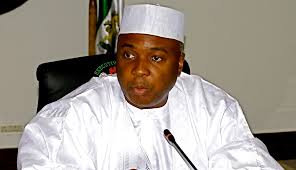
SIR: Fair comment on a matter of compelling public interest propels this intervention on the ongoing trial of the Senate President, BukolaSaraki and his deputy, Ike Ekweremadu.
It is public knowledge that both presiding officers, along with two others, have been docked for their alleged complicity in purportedly doctoring the Senate Rules or Standing Orders 2015. The Hon. Attorney-General of the Federation, Abubakar Malami is the prosecutor.
I believe that it is imperative, in the public interest, to ask whether the said probe is just that i.e., in the public interest. This is because, in my view, by virtue of the doctrine of separation of powers under the Constitution, as well as the provisions of Legislative Houses (Powers & Privileges) Ordinance (now Act) in Cap. 102 of the Laws of the Federation and Lagos 1958, such proceedings are either ill-advised or subject to be terminated summarily at the instance, ironically, of the Senate President.
Section 26 of the Legislative Houses (Powers and Privileges) Act provides that:
“Any person, being a defendant in any civil or criminal proceedings instituted for or on account of or in respect of the publication by such person or by his servant, by order or under the authority of a Legislative House, or of any reports, papers, minutes, votes or proceedings, may on giving the plaintiff or prosecutor, as the case may be, twenty four hours written notice of his intention, bring before the court in which such civil or criminal proceedings are being held, a certificate under the hand of the President of the Legislative House stating that the reports, papers, minutes votes or proceedings in respect of which civil or criminal proceedings have been instituted were published by such person or his servant by or under the authority of a Legislative House together with an affidavit verifying such certificate; and such court shall thereupon immediately stay such civil or criminal proceedings and the same and every process issued therein shall be deemed to be finally determined.” (Emphasis supplied).
Therein, in my view, lies the irony. In other words, by virtue of this provision, it appears that Saraki, in his capacity as the Senate President, can summarily terminate the said trial for alleged forgery of the Senate Standing rules by simply issuing a certificate and a verifying affidavit, affirming that the allegedly forged rules were published by or under the authority of the Senate. To that extent, I submit that this power is complementary to that of the Attorney General of the Federation to enter a nolleprosequi under Section 174(1)(a) of the Constitution. Assuming this view is correct, one might be forgiven if he wonders what the fuss is all about. Or is it little more than a storm in a tea-cup?
In making this submission, I concede that only Senators Saraki and Ekweremadu – and not the entire Senate – are on trial. I, however, submit that, having regard to the provisions of Section 27(1)(a) of the Interpretation Act, Cap. 123, LFN 2004, that would be a distinction without a difference. This is because, by virtue of the said provision of the Interpretation Act:
“Where a body established by an enactment comprises three or more persons, then any act which the body is authorized or required to do may be done in the name of the body by a majority of those persons or of a quorum of them.”
I submit that to the extent that the Senate comprises of 109 Senators (vide Sections 48, 2(2) & 3 of the Constitution), coupled with the fact that the Senate is entitled, vide Section 60 of the Constitution, to regulate it own procedure, any challenge to the validity of those Rules, in my view, will not succeed unless it can be shown that they were enacted by a minority of Senators, or by a group of them which did not constitute a quorum.
END

Be the first to comment